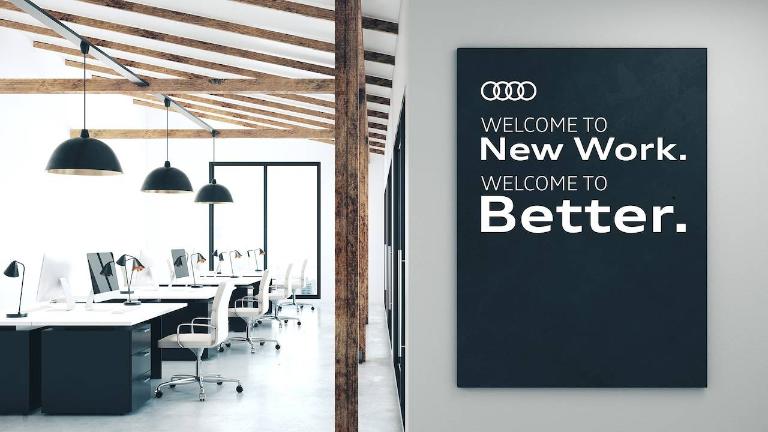Audi focuses on agile and flexible work, following the principles of New Work
Born in the 1970s, the concept of New Work has evolved and enriched during the pandemic. Smart working, flexibility and individual responsibility are becoming increasingly important.
New Work is the definition of a new approach in the world of work that Audi has strongly embraced. It is a different way of working, based on home working, agile teams, and increased flexibility. And for this innovative approach to succeed, employers and employees must join forces, to define and implement the right conditions.
New Work involves more freedom and self-determination for employees, but also more listening to their opinions and needs, resulting in a deeper level of fulfilment. And all of this is the result of the sum of several innovations in the workplace: flat hierarchies, home working, flexible hours, agile working and so-called job sharing.
Employees are no longer just doing tasks that others decide for them, but are actively participating and helping to define processes. It is a profound paradigm shift from the traditional work model based on clearly defined hierarchies, rigid work hours, control and authority.

Expectations and philosophy
Expectations towards work are changing, both in terms of the job itself and the perception of one's company: a survey conducted by Randstad in Germany found that 74% of employees want to find meaning in their work, particularly the younger generation. At the same time, only 52 percent of respondents identify with their employer.
Where does the concept of New Work come from? Social philosopher Frithjof Bergmann first coined the term in the 1970s, but there is no universally valid definition. Bergmann was convinced that work should no longer be forced: people should work because they want to, not because they have to. Today the concept of New Work is constantly evolving, both in terms of meaning and interpretation.
Digitization and globalization
Digitization and globalization are two key aspects in the world of work, and the pandemic has accelerated the development of a culture of hybrid collaboration in many industries and companies. New Work benefits both companies and employees, because if the former are more responsive to the individual needs of the latter, they are more motivated and productive and perform better as a team.
Even before the pandemic, a large-scale study conducted by the Massachusetts Institute of Technology (MIT) found that working from home makes some people more effective, enabling a better work-life balance. Companies, on the other hand, need to counter the shortage of skilled workers by creating increasingly attractive forms and environments of work that will retain talent over the long term.

Mobile work
Mobile work is central to New Work because it makes employees flexible and untied from a single location. However, working by exchanging information 'virtually' does not automatically lead to success. Several studies, including those by the technology and management consulting firm Detecon and the University of Münster, show that anonymity, little sense of community and trust, little multimedia expertise, and a lack of collaboration tools quickly negate the benefits of mobile working. And this means that it remains very useful to regularly compare and exchange ideas in person, especially when dealing with complex tasks.
Challenge and change
The key elements to fully exploit the benefits of New Work have been identified as innovative working environments and cutting-edge expertise, including technical and organizational competence, as well as the need for new leadership skills among managers.
New Work requires trust and personal responsibility from each and every individual, while managers will have to step up to the plate, acting as 'coaches' leading a group. It is a change that poses a great challenge to both companies and employees and will take time, not least because focusing on customers' desires and expectations will remain crucial if companies want to be competitive.
Neckarsulm and Ingolstadt
Audi is working in precisely this direction, preparing for the working world of the future: in the "Better Normal" project, hybrid work will become the company standard. A number of pilot projects have been activated in Neckarsulm and Ingolstadt, each with about 150 employees, lasting several months and testing new approaches. Newly designed offices and digital tools, shared desks, and a focus on mobile working - so the ability to work anywhere, not necessarily in the office or at home - are just a few examples of how Audi is planning for the transition. All of this without neglecting health care, occupational safety and data security.
Together with the Works Council, Audi is also working on concrete solutions for departments where remote work is not possible. One of the goals is to make working hours more flexible, to improve work-life balance; others are a push towards digitization and the optimization of work environment and ergonomics. At the end of the pilot projects, Audi and the Works Council will decide together how and to what extent New Work innovations can be implemented.
Source: AUDI AG
VGI | Responsible OU: VP | Creation date: article date | Class 9.1
